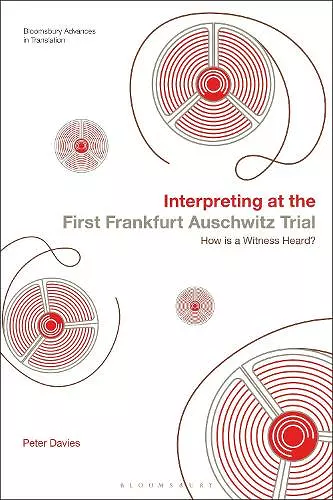Interpreting at the First Frankfurt Auschwitz Trial
How is a Witness Heard?
Format:Hardback
Publisher:Bloomsbury Publishing PLC
Publishing:12th Jun '25
£95.00
This title is due to be published on 12th June, and will be despatched as soon as possible.

Explores the work of interpreters and translators at the First Frankfurt Auschwitz Trial.
This book explores the work of interpreters and translators at the First Frankfurt Auschwitz Trial of 22 former SS Auschwitz personnel in the mid-1960s, when the voices of dozens of witnesses, speaking 10 different languages, had a profound impact on public understanding of the Holocaust in Germany and beyond.
The book asks vital questions about how victims of genocide can make their voices heard in legal systems, and the processes by which the testimony of Holocaust survivors has entered the public record. The author discusses interpreters’ professional practice and ethical self-understanding in the unequal linguistic and institutional structures of the courtroom, and shows how translation and interpreting affected the way victims’ voices were heard.
The survivors came from many different national, linguistic and cultural backgrounds, and their testimonies are often multilingual or hybrid, providing illuminating insights into the significance of the language(s) in which testimony is given, but presenting interpreters with linguistic and ethical challenges.
The preserved audio recordings of courtroom testimony show that interpreters and translators played a key role not only in attaining justice but also in helping to shape the ways in which victim testimony was given, heard, understood and valued within and beyond the courtroom. The author considers how trust is established, developed, challenged and lost, and how this affects the ability of Auschwitz survivors to give testimony in a complex and emotionally demanding situation. In doing so, he also explores the contribution of interpreting and translation to the developing memory of the Holocaust in the 1960s and to the public image of the survivor-witness.
Peter Davies takes a very insightful look at the details of linguistic communication in court, in which the interpreters played an essential but hitherto little-noticed role. With his study, Davies has added a new, important aspect to this already intensively studied trial. * Katharina Stengel, Fritz Bauer Institute, Germany *
This book is the first one that focuses on the role of translating and interpreting during the Frankfurt Auschwitz Trial. In his rigorous, thorough, insightful, and original exploration of the live recordings of the courtroom testimonies, Peter Davies shows how the mediation of the survivor witness's voice through translators and interpreters not only reflects the latter's professional practices and ethics but also interpersonal relationships between witnesses and their interpreters. Davies demonstrates that translators and interpreters played a crucial role in shaping courtroom testimonies and thus contributed considerably to Holocaust memory and understanding in Germany.’ * Beate Müller, Professor Emeritus, Newcastle University, United Kingdom *
The Holocaust occurred in dozens of languages, yet Holocaust Studies has only recently begun to fully attend to the dynamics of translation. With his meticulous analysis of the pivotal role of interpreters at a major post-war trial of Holocaust perpetrators, Davies contributes substantially to this burgeoning area of scholarship. * Erin McGlothlin, Gloria M. Goldstein Professor of Holocaust Studies, Washington University in St. Louis, USA *
ISBN: 9781350469648
Dimensions: unknown
Weight: unknown
312 pages